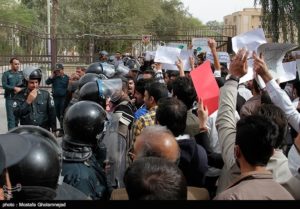by WorldTribune Staff, March 5, 2017
The Iranian government is moving quickly to put down massive protests over power blackouts and water shortages in the oil-rich Khuzestan region and ongoing workers’ rights protests in Teheran.
The National Council of Resistance of Iran (NCRI) – a coalition of Iranian opposition groups in exile lead by the banned People’s Mujahedin of Iran (MEK) – said the government dispatched anti-riot police from neighboring Fars Province to contain the Khuzestan protests.

Local police forces in Khuzestan, according to the opposition group, have also declared all demonstrations illegal with authorities said to have attempted to slow state-supplied Internet connections to prevent the upload of videos recorded at demonstrations, according to a report by TheNewArab website.
In Teheran, thousands of employees from diverse fields, including nurses, mine workers, teachers, and bus drivers, gathered in front of the parliament and Teheran’s City Hall last week, demanding job security, wage rights, and job insurance, American Thinker reported on March 5.
“The rallies were held under severe security measures,” according to the NCRI. “The suppressive forces were in tight control of the parliament’s and the city hall’s surrounding areas for fear of large groups of people joining the protest, and were barring pedestrians from stopping and joining the protesters.
“Passers bye hailed the protestors and paid sympathy and tributes to them as they signaled their hatred of the regime.”
Some members of parliament have labeled the demonstrations a “national threat” and called for the resignation of figures including the country’s energy minister.
In a statement posted on his official Twitter page acknowledging ongoing protests, supreme leader Ayatollah Ali Khamanei called on the government of President Hassan Rouhani to address the ongoing problem.
“Current issues in Khuzestan are heartrending for any human being; outages of power, water and communications services in the cold weather is very difficult for the people; officials are responsible to take measures to address these problems,” Khamenei said.
During recent demonstrations in the city of Ahvaz, protesters chanted slogans such as “death to tyranny” and “we, the people of Ahwaz, won’t accept oppression” and also called for the resignation of the province’s governor.
Around 35 percent of Iran’s water and electricity comes from the Khuzestan province, which also contains numerous oil and gas factories. Despite being resource-rich, poverty levels in Khuzestan are among Iran’s highest.
Abbas Papizadeh, a member of parliament from the city of Dezful, told local media that the problems in Khuzestan had been lurking under the surface for years, with thousands in the region affected by skin and breathing problems caused by air pollution.
“The Khuzestan province for years has been struggling with the issue of particulates, but this issue now is becoming a national threat,” said Papizadeh.
According to the World Health Organization, Ahvaz, Khuzestan’s provincial capital, is among the world’s most polluted cities.
Statistics from Iran’s Health Ministry state that more than 80,000 people die in Iran each year as a result of environmental pollution.
